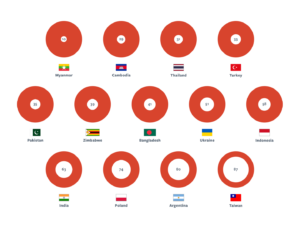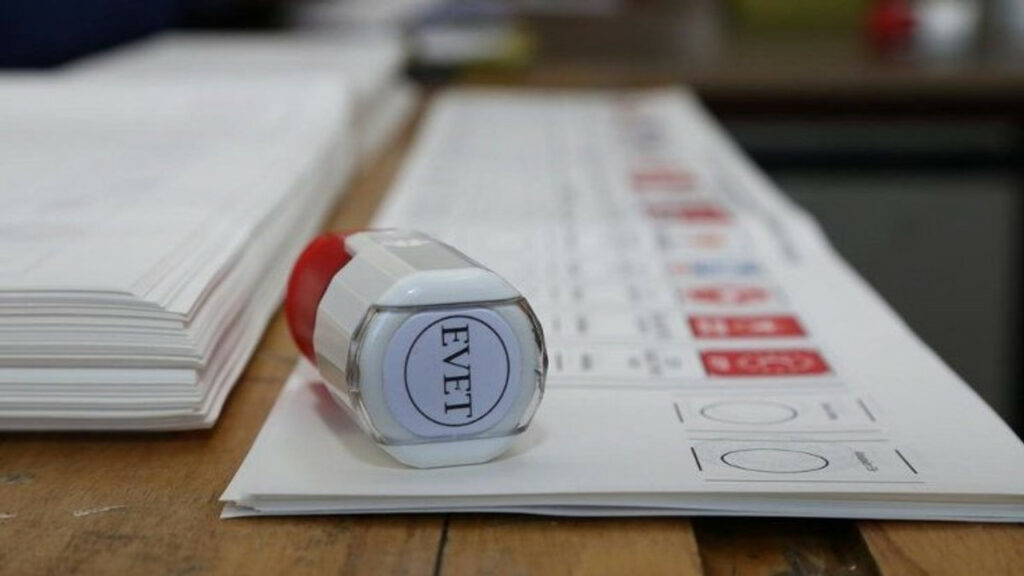According to an index newly created by Freedom House, Turkey’s May 14 presidential and parliamentary elections are among the most vulnerable in the world, scoring 33 out of 100, with 100 representing the least vulnerability in terms of election integrity, trailing behind Pakistan and Zimbabwe.

As part of a new research initiative called Election Watch for the Digital Age, which aims to investigate the relationship between digital platforms and election integrity, Freedom House has developed an Election Vulnerability Index (EVI) composed of key indicators related to a country’s political rights and internet freedom, derived from their annual Freedom in the World (FIW) and Freedom on the Net (FOTN) reports.
Turkey’s EVI score reflects the concentration of government power, strict laws that criminalize online expression and extralegal attempts to silence independent journalism and suppress dissent, according to Freedom House.
The country is rated “Not Free” in the FIW 2023 and FOTN 2022 reports by Freedom House.
The EVI score is composed of three categories: digital sphere, electoral system and political participation, and human rights.
Turkey scored 9 out of 32 in the digital sphere category, which assesses such issues as government control over internet infrastructure, content blocking and filtering, online manipulation, legal penalties for online activities and hacking and cyberattacks.
The country scored 13 out of 32 in the electoral system and political participation category, which evaluates the fairness of elections, impartial implementation of electoral laws, political party organization, opposition opportunities and government transparency.
For the human rights category, which covers freedoms of the media, expression and assembly, NGO operation, independence of the judiciary, equal treatment of different population segments and protection from the illegitimate use of physical force, Turkey scored 11 out of 36.
Four candidates have qualified to run in Turkey’s presidential election to be held on May 14, according to a preliminary list announced by the country’s election authority, the Supreme Election Board (YSK).
President Recep Tayyip Erdoğan, who is seeking re-election, main opposition Republican People’s Party (CHP) leader Kemal Kılıçdaroğlu, Homeland Party leader Muharrem İnce and Sinan Oğan, the candidate of a bloc of four far-right parties, are the four candidates who have qualified to run in the presidential election.
Erdoğan is the candidate of the Public Alliance, which includes his ruling Justice and Development Party (AKP), the far-right Nationalist Movement Party (MHP) and several other small opposition parties, while Kılıçdaroğlu is the candidate of an opposition bloc of six parties including his CHP, the nationalist İYİ (Good) Party, the conservative Felicity Party (SP) and three other parties.
According to Freedom House, thousands of websites are blocked in Turkey, and this censorship hinders voters’ ability to access accurate and diverse sources of information ahead of the vote.
Freedom House also highlights “information manipulation” as a significant concern, with the AKP-aligned public media outlets and government manipulation of social media content adversely impacting the online information landscape. Reports suggest that the AKP has enlisted an “army of trolls” to manipulate online discussions and combat government critics on social media.
Arrests and prosecutions of journalists, activists and ordinary people for criticizing or discussing government officials online are also pressing issues, according to Freedom House. The new “Law on Combating Disinformation,” which imposes criminal penalties on those who deliberately share content online deemed “fake,” could be used to prosecute internet users and facilitate the AKP’s efforts to silence dissent ahead of the elections.
According to the index, these issues raise concerns over Turkey’s election integrity and the ability of opposition parties to challenge the incumbent government effectively.



